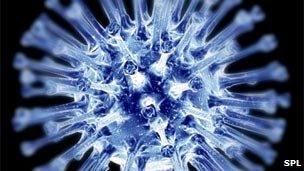Narcolepsy 'link to swine flu jab'
- Published

Million doses of swine flu vaccine have been given in the UK
An increased risk of narcolepsy has been found among English children vaccinated with the swine flu vaccine, Pandemrix.
A Health Protection Agency study found a 10-fold increased risk in cases of the sleep disorder in children seen in sleep centres who had received the jab.
Manufacturer GlaxoSmithKline (GSK) has been ordered to investigate the link.
Families who believe they were affected are now considering a group legal action.
Pandemrix was most widely used in the UK during the 2009-10 flu pandemic and given to almost a million British children between six months and five years old. The vaccine, which is no longer used, has already been linked to narcolepsy in youngsters from Finland, Sweden and Ireland.
Narcolepsy is a rare sleeping condition. The main symptom is falling asleep suddenly and it may also cause muscle weakness.
The HPA abstract paper, from Developmental Medicine in Childhood Neurology, was presented to a conference of paediatricians in Manchester and is now being considered for publication in full by the British Medical Journal. It estimates the risk was one in 52,000 in those vaccinated.
Specialists reviewed 75 children aged four to 18 who developed narcolepsy about the time Pandemrix was rolled out. Of these, 18 had received Pandemrix.
They found a 10-fold increased risk of the condition within six months of having the jab which "suggests a causal association consistent with reports from Finland and Sweden".
An expert in vaccines who was in charge of one of the paediatric clinical trials of Pandemrix, Prof Adam Finn from the University of Bristol, said: "The risk is so much increased that it seems very unlikely that this is a biased result.
"The bottom line is they have found they were somewhere between 10 and 16 times more likely to have had Pandemrix than other children. So that confirms what you would expect to see based on other studies done in Finland, Sweden and Ireland, which are all the same."
Research programme
The European Medicines Agency (EMA) warned in 2011 that Pandemrix should only be given to children and teenagers at risk of H1N1 flu if other jabs are unavailable because of concerns of potential link to narcolepsy.
It has ordered GSK to commit to a complex research programme to look at the root causes.
GSK say they take the safety of patients very seriously and are working hard to better understand the research emerging from a select number of countries.
A spokesperson said: "Narcolepsy is a complex disease and its causes are not yet fully understood but it is generally considered to be associated with genetic and environmental factors, including infections.
"It is crucial that we learn more about how narcolepsy is triggered and how Pandemrix might have interacted with other risk factors in affected individuals. Throughout development there was no data suggesting a potential for an increased risk of narcolepsy among those vaccinated."
It is understood that one possible trigger is the high levels of adjuvant in the vaccine used to enhance the recipients response.
The UK government, which gave GSK a legal indemnity against having to pay compensation, could now face the prospect of a group legal action by families affected.
The Department of Work and Pensions, which is responsible for administering Vaccine Damage Payments Scheme says there is currently insufficient medical evidence to show that the swine flu vaccine causes narcolepsy.
A spokesperson for the Medicines and Healthcare products Regulatory Agency said: "The results of the HPA study are consistent with earlier evidence from some other EU countries and support the regulatory action already taken in Europe to restrict the use of Pandemrix in those aged under 20 years."
- Published21 July 2011